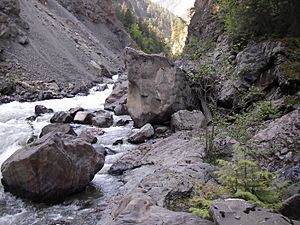Cayoosh Gold Rush facts for kids
The Cayoosh Gold Rush was an exciting time when a lot of gold was found near Lillooet, in British Columbia, Canada. Some people believe it was one of the biggest gold discoveries ever in the province!
Contents
The Cayoosh Gold Rush: A Golden Discovery
Where Was Cayoosh Creek?
Cayoosh Creek is a smaller river that flows into the Fraser River. It joins the Fraser River near Lillooet, after also meeting the water from Seton Lake. About 9.5 kilometers (6 miles) upstream from where it meets the Fraser River, there used to be a big waterfall called Cayoosh Falls. Today, this waterfall is covered by a small dam.
In early 1884, people started looking for gold along Cayoosh Creek, between the waterfall and the Fraser River. By the end of that year, about 600 men were already working there. Every part of this section of the creek had been claimed for gold mining.
Who Found the Gold?
What made the Cayoosh Gold Rush special was that all 300 people who claimed land to mine were Chinese. News of the gold discovery spread quickly among the Chinese communities in the Fraser Canyon and the Cariboo region. Because of this, all the good spots were claimed before anyone else even knew about the find.
How Much Gold Was Found?
Caspar Phair was a local government official who recorded all the gold claims. In 1887, he estimated that about C$6-7 million worth of gold had been taken from Cayoosh Creek. This was a huge amount! To give you an idea, during that same decade, the official total gold found in the entire province of British Columbia was only about C$1.5 million. This shows how incredibly rich the Cayoosh Gold Rush was.
What Happened After the Rush?
By the end of the 1880s, most of the gold in Cayoosh Creek had been found. However, this gold rush brought new attention to the Lillooet area. It encouraged more people to explore for gold in nearby regions.
For example, the famous Golden Cache Mine was discovered further up Cayoosh Creek. Other important gold discoveries happened in the Bridge River goldfields. A profitable mine was also found at McGillivray Falls on Anderson Lake, west of Seton Lake. All these new discoveries happened because of the excitement and exploration that the Cayoosh Gold Rush created.
 | Frances Mary Albrier |
 | Whitney Young |
 | Muhammad Ali |


